A potential seismic shift of the Scotland's marine area lies ahead, but what about the fishing communities who make up part of its landscape?
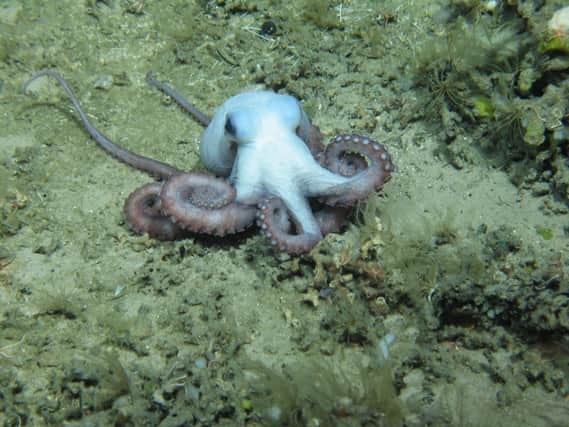

The new 10m static gear creel boat, called Harbour Maid, will make what can be a treacherous journey in the Atlantic ocean setting steel traps a bit safer for the 45-year-old father-of-three and his crew, some of whom have been fishing off the island for generations.
But future of Mr MacPhail and his three employees, some of whom have young families, hangs in the balance after the Scottish Government announced it will be designating at least ten per cent of Scotland’s waters as Highly Protected Marine Areas (HPMAs) by 2026 – sites where fishing will be prohibited.
Advertisement
Hide AdAdvertisement
Hide AdAlthough the Tiree community could be directly impacted by these new protection zones, Mr MacPhail said there was “zero stakeholder engagement” before the proposals were announced in December last year.
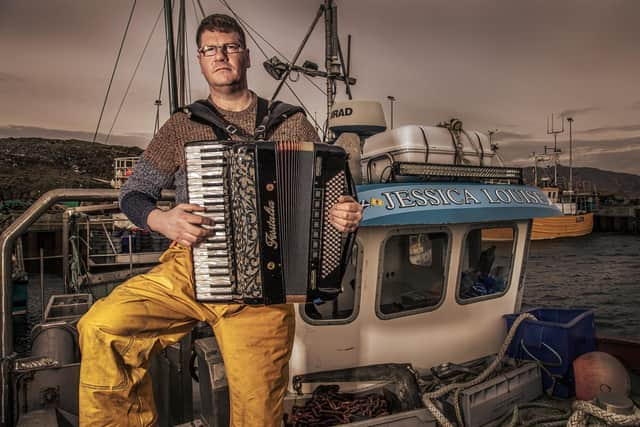

A four-month consultation on HPMAs followed, which saw major backlash from island communities, fishing federations and some politicians representing Scotland’s rural areas.
The Scottish Fishermen’s Federation (SFF) said they would be “catastrophic”, while Gaelic quango Bòrd na Gàidhlig said Scotland’s indigenous language could be at risk with the potential loss of employment in areas with a high percentage of Gaelic speakers.
Despite their invitation to respond, many members in the fishing community said the Scottish Government’s attempt to include their input “came too late”.
“We are looking down the barrel of a loaded gun,” said Mr MacPhail, whose business supports his partner Alison Campbell and their three children, aged one, three and six.
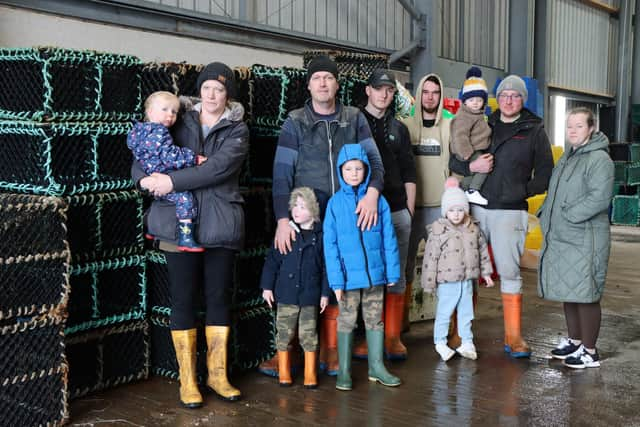

“I went down the route of getting this new boat not to increase fishing but to save me time, to make the job smoother so that I could get back home in time to read the children their story at night. But now it could be all for nothing.”
Mr MacPhail is one of many islanders who lives off the marine habitat and whose businesses are now in limbo as they wait to hear where the new HPMAs will be.
The Scottish Government said the proposed zones could overlap either fully or partially with existing Marine Protected Areas (MPAs), which already cover 37 per cent of Scotland’s seas, or could be located outside them. But nothing has been confirmed yet. In fact, it could be a three-year wait before some communities know where the no-fishing zones will be.
Advertisement
Hide AdAdvertisement
Hide AdMr MacPhail added: “The lack of communication with us from the government before they announced these proposals shows the total disconnect and scant regard these politicians have for rural communities. We should have been involved from the start. It’s our livelihoods at stake.”
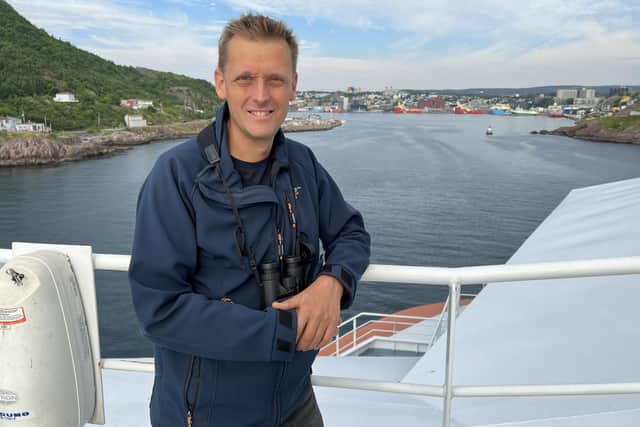

Mr MacPhail, who has had to put plans to extend his home on hold for fear of losing his business, said the new proposals have crushed confidence in the coastal communities.
“Depopulation is the biggest threat to the islands and we are already hanging on by a thread here. Bringing in these HPMAs will drive even more people away. There’s no incentive to stay when the government treats you with such scant regard.”
He claimed the new marine zone proposals are akin to the Highland Clearances – the forced eviction of inhabitants of the Highlands and western islands of Scotland in the 18th and 19th centuries.
“It’s not just our jobs at risk; our whole culture, our history, is threatened. All around the islands you have people who have, for years, gone out to catch fish for their families as a part of life. It’s what makes these places magical to live in, but it’s also very much part of our identity. But soon, this will become a criminal activity. These politicians are taking our identity away.”
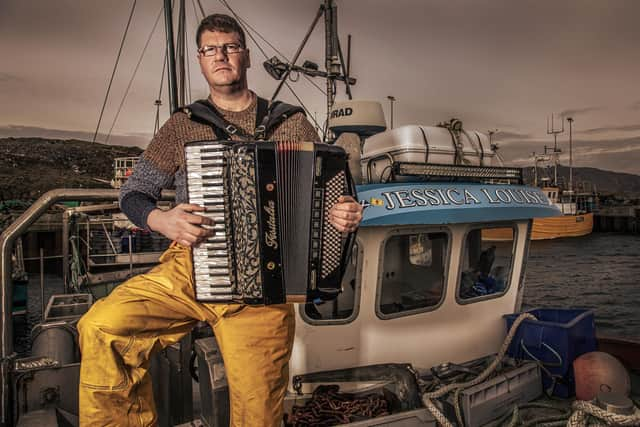

The fisherman said the ministers steering the proposals “need to go back to the drawing board.”
“The policy is dividing science and industry, but we should be coming together on this. The irony is your extreme environmentalist and your fisherman want the same thing; we both want healthy seas. Our lives depend on it.”
Mr MacPhail’s brother, Angus, a creeler off Barra, said there is “palpable anger” among the fishing community.
Advertisement
Hide AdAdvertisement
Hide AdThe 43-year-old co-wrote a protest song with fellow fisherman and singer Donald MacNeil, 64, to record “The Clearances Again”, which made number five in the UK download charts this week, days after being released.
“These arrogant politicians in the city proposing this level of regulation will wipe out entire communities,” he said.
“How can we continue to invest in our businesses when we are in total limbo.
“If there was any respect we would have been involved from the embryonic phase.
“To say ‘we are going to ban fishing in ten per cent of waters, but we don’t know where just yet’ is cruel.
“That’s like saying ‘we are going to cut off all your limbs, might be your legs, but it could be your head.
“There is an entire industry in hiatus at the moment. No one knows whether or not we will be shut down in the next few years. The axe is going to fall, but we don’t know where.”
The Hebridean fisherman said one of the questions asked in the consultation, which closed on Monday, read “is there any more weight given to feedback via the consultation from people living in affected areas as opposed to those living out-with affected areas” to which he said the reply was no.
Advertisement
Hide AdAdvertisement
Hide Ad“If you look at the population numbers of coastal areas compared to city areas, we are at a massive disadvantage,” he said.
“You could get thousands of so-called environmentalists in Edinburgh and Glasgow saying ‘oh HPMAs are amazing for the environment’, but who have absolutely no clue about the aspects of the environment they’re referring to, and who will totally outweigh, in a numbers game, the views of those who will have their lives turned upside down.”
The campaign coalition Our Seas, which has been calling for the reinstatement of a limit on bottom-trawling and dredging to allow marine life to recover, said the process around the HPMAs however was a concern.
Members said the priority is to protect coastal waters from the most damaging fishing methods to safeguard low impact fishing and that the measures are being proposed because successive governments have “failed to take adequate action to protect and recover Scotland’s inshore zone, including in existing marine protected areas”.
The group said the spawning stock level of west coast cod and herring are at near record lows, citing the International Council for the Exploration of the Sea, and that 58 per cent of the Scottish seabed is classed as “highly disturbed”.
Our Seas said that, according to the 2019 UK Marine Strategy, bottom-towed fisheries are the main driver for seabed damage, yet bottom trawling and dredging are permitted in 95 per cent of Scotland’s seas.
A survey it carried out recently “to help inform public debate” on HPMAs said 69 per cent of respondents are concerned about the impacts of fishing on the marine environment, a statistic which the Scottish Fishing Federation dismissed as “misleading.”
Political conflict
Despite HPMAs being a key product of the Bute House Agreement which brought the Greens into the coalition government, views within the two parties are polarised.
Advertisement
Hide AdAdvertisement
Hide AdSupporters of the no-fishing zones said they will “provide the best possible chance of protecting and restoring marine ecosystems so they can continue to support marine industries and the communities that depend upon them”.
What would this mean in practice?
According to the Scottish Government: “These sites will provide high levels of protection by placing strict limits on some human activities, such as fishing and aquaculture, while allowing non-damaging recreational activities to take place at carefully managed levels.”
As far as fishing is concerned, the message could not be any more clear: “It is intended that commercial fishing of any kind and by any type of vessel will not be allowed within HPMAs. This includes fishing with static gear, mobile gear and hand collection by divers.”
The only industry which seems to be exempted from the prospect of HPMAs putting it out of business is renewable energy, with areas already designated for major windfarm projects excluded from consideration for designation as HPMAs.
According to the consultation paper: “Given the need for increased offshore renewable energy capacity, the introduction of HPMAs will need to complement these targets and should not hinder their achievement.
“Any areas with renewable developments that already exist, are consented, or have draft or adopted plans will be scoped out of the HPMA selection process. This will include, for example, all ScotWind projects (and their associated infrastructure) awarded in January 2021, for which option agreements are in place”.
There are also some concessions to “marine tourism” and a “permitting system” is proposed to “limit the number of recreational vessels which can be in a HPMA at particular times”.
The Scottish Greens said opponents to the proposals would be "handing a death sentence to future generations”.
Advertisement
Hide AdAdvertisement
Hide AdMark Ruskell, climate spokesperson for the Scottish Greens, said the "tried and tested" plans must go ahead.
"Nobody can deny that we need to protect our seas, that we need to create a circular economy, transform our energy supplies and completely reimagine our transport solutions,” he said. “Yet Labour and the Tories are conspiring against these most vital of actions.
"Those who are actively working against those aims are in effect handing a death sentence to future generations with their stubborn political ambition."
But Kate Forbes, who was narrowly defeated by Humza Yousaf in the contest to be SNP leader, called for the HPMA proposals to be scrapped.
The MSP for Skye, Lochaber & Badenoch lambasted her ministerial colleagues for “poor decision-making”, policy-making in “silos” without regard for wider impacts, and working against efforts to stem rural depopulation.
She said no other EU country has implemented HPMAs, and there is no evidence to demonstrate they actually achieve their aims.
Na h-Eileanan an Iar SNP MP Angus MacNeil said the proposed zones are “ill-conceived” and “driven by people who don’t understand the issues.”
But Net Zero and Just Transition Secretary Mairi McAllan said, recognising “the considerable strength of feeling” on the issue, that “it has always been our intention to develop these ambitious proposals in close collaboration with those impacted by them – in particular, people living and working in our island and coastal communities.”
Advertisement
Hide AdAdvertisement
Hide AdShe will be vising island communities in the weeks ahead, and said there will be further opportunities for individuals, communities and businesses to have their say.
An expert view
Professor J Murray Roberts, head of the University of Edinburgh’s Changing Oceans Research Group, echoed Kate Forbes’s view that politicians leading on HPMAs “need to get rid of the siloed approach”.
He promotes the idea of “rewilding the ocean”, but insisted more research to map out marine areas needs to be done, coupled with a joined-up approach to marine conservation with communities.
“If my family were in a community that was going to lose its income from this, I would be really onto this, and very likely against it,” he said.
“It would need to be very clear to me what the benefit was going to be. That’s why we need to embed the science in the communities. The two need to come together to help run a functioning ecosystem.”
Professor Roberts gave the example of a current MPA, which lies 13km east of Mingulay. It is the only inshore deep sea coral reef in the UK, which stems from when the ice sheets retreated and the corals started developing around 8,000 years ago.
“Local fishermen in the area, who are mostly men, weren’t fishing it. Why? Because they knew it was there, and they wouldn’t go anywhere near it, probably because they would lose their nets.”
He also spoke about the close connection between the scientists and fishermen at the St Abbs Marine Station, on the Berwickshire coast, where the university runs projects.
Advertisement
Hide AdAdvertisement
Hide Ad“The marine station is one of the oldest in the UK and creeling, a very low impact fishery, is allowed, and we have a really close relationship with the creelers. The station does useful work for the fishermen; it measures the lobsters, looks at eggs, looks at the brown crab. They work together, and that’s the way to do it.”
Professor Roberts also pointed to an MPA in the Pitcairn Islands, a British overseas territory in the South Pacific, which recently won a prestigious award for its management of fishing and marine life in unison.
The area is 842,000km2 of a “no take zone” in which removing or destroying natural or cultural resources is prohibited.
“We have cultural fishing practices which allows us locals to fish for our own consumption. It’s a very special and pristine place,” said Michelle Christian, division manager for environmental conservation and natural resources on the island after the Marine Conservation Institute announced the site won the Blue Parks Platinum award for exceptional marine wildlife conservation.
“It’s also breeding ground for humpback whales and has spectacular coral.”
Professor Roberts said the scientific community back in the UK is “really strong”, and could also be on the global stage for “leading the world in integrated use of the marine environment.”
“It’s very easy for governments to get swept away in the shiny new future and the unintended consequences that we have to understand get a little bit forgotten,” he said.
“Often industry, such as fishermen, oil companies, aren’t in the room when it comes to these debates, and the voices of the Blue Economy are missing. But they are very much part of it.”
Advertisement
Hide AdAdvertisement
Hide AdBut while there are examples of fishing communities working hand in hand with conservationists, the MacPhail brothers said they have lost all confidence in the Scottish Government to protect their livelihoods.
"Yes there are areas where fishing is allowed in MPAs and Special Protection Areas, we have those near us, but it’s totally irrelevant in the HPMA context as these proposals are banning every bit of our work,” Neil MacPhail said.
"For the first time in my life I am looking at a future of unemployment and having to leave my home.”
HPMAs elsewhere
Under the UK Government, there are already three proposed HPMA sites: Allonby Bay (in the Irish Sea), North East of Farnes Deep (in the Northern North Sea) and Dolphin Head (in the Eastern Channel off southern England) which are due to be created by July this year.
There were initially another two proposed, Lindisfarne off Northumberland and Inner Silver Pit South (south of the Humber), but they were dropped over socioeconomic impacts, including the cost to fishers.
Defra received 915 responses to the consultation. Overall, 56 per cent supported the designation of pilot HPMAs in English waters and 36 per cent were opposed.
The majority of respondents (77 per cent) were not members of an any environmental organisation (for example, charities, non-governmental organisations or community action groups), while 13 per cent were members of an environmental organisation not specific to marine issues and five per cent were members of marine-focused organisations.
Comments
Want to join the conversation? Please or to comment on this article.